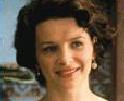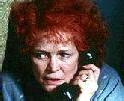 Photo © 2000 DreamWorks Pictures |
Joan Allen — Best Actress, The Contender Why You Already Knew Her: She played tight-lipped wives in everything from the stunning Face/Off and Nixon to the overrated The Ice Storm and Pleasantville. Nominated in 1995 for Best Supporting Actress in Nixon, she received a second nod in the same category the following year for possibly her greatest screen performance so far, in Nicholas Hytner's The Crucible, with Daniel Day-Lewis and Winona Ryder. Where to Go Next: Manhunter—Directed by Michael Mann (Heat, The Insider), this 1986 suspense thriller was based on Thomas Harris' novel Red Dragon. Allen plays a blind photo developer who pops up halfway through the movie—and possibly for the first time until The Contender, she gets to play a sexually forward, unrepressed character. Added bonus is that Hannibal Lecter makes his first screen appearance; he isn't played by Anthony Hopkins, but the performance of Brian Cox in the role is worth catching and comparing. B |








